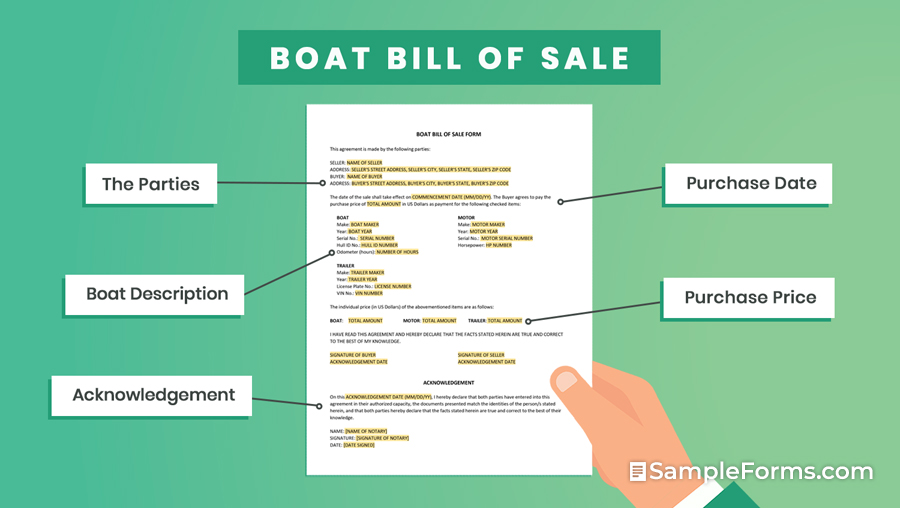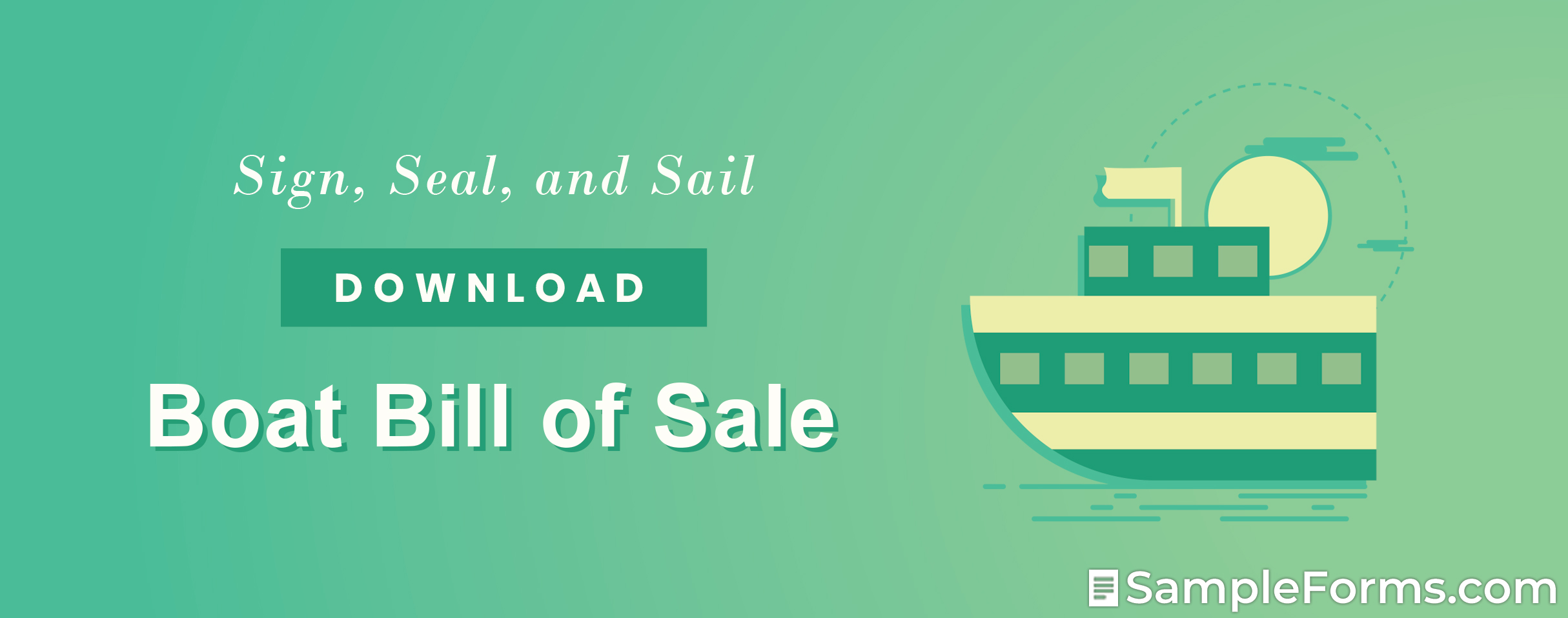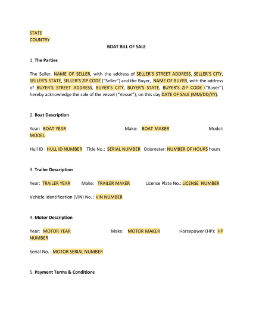- Eviction Notice Forms
- Power of Attorney Forms Forms
- Bill of Sale (Purchase Agreement) Forms
- Lease Agreement Forms
- Rental Application Forms
- Living Will Forms Forms
- Recommendation Letters Forms
- Resignation Letters Forms
- Release of Liability Agreement Forms
- Promissory Note Forms
- LLC Operating Agreement Forms
- Deed of Sale Forms
- Consent Form Forms
- Support Affidavit Forms
- Paternity Affidavit Forms
- Marital Affidavit Forms
- Financial Affidavit Forms
- Residential Affidavit Forms
- Affidavit of Identity Forms
- Affidavit of Title Forms
- Employment Affidavit Forms
- Affidavit of Loss Forms
- Gift Affidavit Forms
- Small Estate Affidavit Forms
- Service Affidavit Forms
- Heirship Affidavit Forms
- Survivorship Affidavit Forms
- Desistance Affidavit Forms
- Discrepancy Affidavit Forms
- Career Assessment - 16+ Examples, Format, Tips, Pdf Forms
- Undertaking Affidavit Forms
- General Affidavit Forms
- Affidavit of Death Forms
Boat Bill of Sale
You can only be deemed the legal owner of a movable or an immovable property as long as you can furnish the supporting documents. Otherwise, it’s just insubstantial talk. When you have to sell your personal property to upgrade or to let it go, you need a bill of sale to legally transfer your ownership to another individual, especially when it comes to something as valuable as a boat. In this article, we will discuss the importance of having a boat bill of sale as well as steps to help you create one. Read More
Boat Bill of Sale
- What Is a Boat Bill of Sale?
- How to Create a Boat Bill of Sale
- Frequently Asked Questions
- 1. Make Sure Your Identities Are Correct
- 2. Include the Buyer’s and Seller’s Personal Information in the Bill of Sale
- 3. Include the Vessel’s Description and Its Applicable Inclusions
- 4. Add the Payment Terms and the Date of Effectivity
- 5. Seal the Document with a Signature
- 6. Have it Acknowledged by the Notary Public
What Is a Boat Bill of Sale?

A boat bill of sale is a certificate indicating the official transfer of personal property. It is a mutual agreement between two parties, the buyer and the seller, and it entails the buyer’s and seller’s information, the vessel’s description, its selling price, and the notary public’s acknowledgment.
For vessels that are less than ten years old, and odometer mileage should be indicated in the bill of sale as required by the Federal and State laws. Failure to do so may constitute a civil liability to the seller. If the vessel is transferred as a gift, then the seller must indicate it in the bill of sale and the amount entered shall be 0$. Other than the legal ownership of the vessel, the bill of sale dictates the amount of sales tax that you have to pay, and it relieves the seller of any liability to the vessel. The bill of sale will also serve as a protective instrument in the future should disputes arise regarding the item in the future.
How to Create a Boat Bill of Sale
A boat bill of sale can be acquired from your motor vehicle’s local department or from the office of the county tax assessor-collector’s office. But, you may also create your own boat bill of sale. Here’s how:
1. Make Sure Your Identities Are Correct
Secure the other party’s identification cards or any further proof that solidifies their identity. This ensures you that you are indeed negotiating with the right person/s. Provide your identification cards as well.
2. Include the Buyer’s and Seller’s Personal Information in the Bill of Sale
Once you are satisfied with the documents presented, you may proceed with crafting the boat bill of sale. In this section, provide the seller’s and your personal information in the document, such as their complete names, residential addresses, the state of residence, and their age. Don’t forget to include your titles, such as The Buyer and The Seller.
3. Include the Vessel’s Description and Its Applicable Inclusions
In this section, you will describe the vessel you want to sell. If it’s motor and trailer will be included in the bill of sale, state it so. The description should include the year in which the vessel was made, the registration number, the hull ID no., the odometer mileage, the present condition, and other distinguishing features. The trailer and motor should have its separate description, too.
4. Add the Payment Terms and the Date of Effectivity
Tackle the payment and the payment terms regarding the vessel. Indicate the item’s full payment, along with its currency and payment deadline. Also, include the date of effectivity of the bill of sale in this section.
5. Seal the Document with a Signature
A mutual agreement can only be mutual once both parties have signed the bill of sale document. Include the names of both parties, the date signed, and their signatures. Before signing, include a statement that says they have read the agreement and that the facts stated are true and correct.
6. Have it Acknowledged by the Notary Public
In the last section of the printable bill of sale, including an acknowledgment, stating that the identities of parties match their identification ID or documents presented and that they have executed the instrument in their authorized capacity. It should have the name of the notary public, his or her signature, and date signed.
Frequently Asked Questions
[/ns_row]
1. How do I make a Boat Bill of Sale?
A bill of sale can be made by following the instructions above. But another alternative is to use templates. Bill of Sale templates has prewritten content that written professionally to ensure the seamless transfer of personal property from party to another. What’s more fascinating with templates is that they are editable if the content does not sit well with you.
2. Do I need a bill of sale to sell a boat?
Yes. The boat bill of sale is a testament that the transaction is complete. You can also use the said Bill of Sale as evidence that the trailer and motor have been sold.
3. Do I need to notarize my bill of sale?
It depends on the state. In New Hampshire, Montana, Maryland, West Virginia, and Nebraska, a notary public is required to witness the document being signed by two parties. If you do not belong to these states, there is no need for you to notarize your bill of sale.
4. How can a bill of sale be voided?
Yes, if the buyer fails to provide payment three days after the sale. The buyer has to state the reason for not continuing the purchase.
5. Is a bill of sale binding?
Yes. It serves as an agreement of the sale between the buyer and seller. The information embedded in the agreement dictates the responsibilities of both parties and restricts certain actions.

